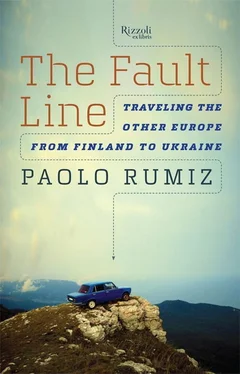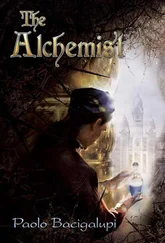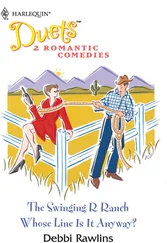I listen to her, ashamed. I’d like to become an alien myself, cry out against this well-mannered fascism that is invading Europe, Italy included.
The pendulum beats out five o’clock. Rita’s husband, Volodya, who has suffered a hemiparesis, is lying on the couch and limits himself to a formal hello.
I ask Rita if she feels any strange presences in the house.
“My granddaughter says she hears whispering, but I tell her that’s stupid, impossible. We are protected by this holy place. In the USSR, the Jews were treated well. We were all happy, poor and equal. If you were a lazy bum, they got you right away and sent you off to work. Today we’re all unequal and unhappy.”
Now Volodya wakes up, nods his head to say yes. He’s never seen anyone pay attention to his life like these two strangers who by chance have come to visit his house. He gets up, takes a case out of a closet, and opens it. “Here, this is our whole story.”
He takes out some old pictures and starts narrating. “The Jews were incredible musicians. Arkadi Kovnatar was a great accordion player. He died just a while ago. Davidoff was another phenomenon. And this here in the photograph is the People’s Wind Orchestra. They were the best in all of Latvia. They didn’t play Jewish music, but four out of five were Jews. Look here: from the left, Karotkin, then Moissev, Kovnatar, and Davidoff. The only non-Jew is the fourth, and he’s also the only one who is still alive. Take a good look at him. Who is it? Why, it’s me, Vladimir Dirbenyov,” and with a glint in his eye, he does a half bow toward an audience that’s not there.
“People used to dance until they were ready to keel over. We played at weddings and funerals; everybody wanted us. Our years with the Jews were our best. When they left, in the early 1990s, everything turned sad.”
Rita: “Who knows which of them are still alive. Ah, zhizn proshla , life has passed by, my dear. But how nice it is to be with you two. We’re people, aren’t we? And people were made to meet one another. Do you want some tea?”
I say that I’d rather hear some accordion. I can tell that Volodya is dying to take it up again. It’s been two years now that nobody has asked him to play. I exhort him, and he doesn’t back away. He gets up and picks up his case. The instrument is really heavy. He rubs his fingers over the keyboard; the emotion is strong, and his hands are stiff from his illness. He makes an enormous effort and tries to play “Come Back to Sorrento.” He struggles with the rusted body, his face is tense, his fingers search for the notes, but slowly the melody takes shape, the bellows swells in search of more difficult notes, and it succeeds. Volodya relaxes and smiles.
Joy has retaken possession of the house of the spirits. “Come on, Volodya, sing for us!” But Volodya shakes his head no and keeps on playing.
We insist, and he looks sly. “Give me a hundred grams and I’ll sing.” “A hundred grams” is the Russian way to say “a little glass,” and a little glass is never denied in the presence of guests.
So Rita brings in the carafe, brandy made from fermented barley—called samogon , “homemade.” Golden yellow, excellent aroma. She explains how it’s made: a kilo of barley, two liters of water left to soak in a bucket with three kilos of sugar. Then you put it on the stove to boil. When the water starts to diminish, you add two hundred grams of yeast, and in two days, the yeast does its job.
Another day to let it cool, and in the end, there’s your samogon , nice and ready.
Rita: “There, now you know our secret. Volodya knows how to do the same thing with wheat. When he went to work in Kazakhstan, he learned that procedure as well.”
Volodya confirms and stamps his foot. “Drinking is fine, but what are we going to eat?” By now it’s clear, our dropping in has been transformed into an invitation to dinner.
On the little table between the couch and the armchair arrives some homemade bread, homemade butter, smoked fish caught by Volodya in the nearby lake, and fresh greens grown by Rita in the greenhouse out back. A triumph of the zero-mile diet. I think that when the great food crisis comes, the Russians will survive, but Europe won’t. The aliens and the uprooted, whom we have forced to learn the art of survival, will survive, too. Like the Jews.
We toast one another and take a sip.
“Good,” says he, satisfied. Now I’ll sing for you, Nekrasov. He concentrates, swells the veins of his neck, his vocal cords, his lungs and then lets go and sings, moving from whispering to thundering, he carries us away like the carpet of The Master and Margarita , in flight into the great Slavic night that surrounds us. The occasional false notes from the long-unused instrument make the singing even more soulful. It’s the duende, sung of by García Lorca—the spirit that possesses a man when he renounces cold perfectionism and performance anxiety.
I can feel that I am in the heart of my journey. It’s all here: Slavic culture, the Jews, uprootedness, the frontier, the return of fascism, the goodness of the least of us. And this Latvian sky that sums up the North and South of my continent.
Rita: “Come on, sing ‘Voyennaya pesnya.’ I want to cry a little. It’s good for me.”
He starts in: “There’s an old tree on the edge of the woods.” She follows, and now they’re singing together, sweet octogenarians. In the refrain I hear Miliy moy Andrei , “My sweet Andrew.” Andrea, like my son. Our mutual longings go searching together.
He grumbles: “My voice is fine; it’s my fingers that can’t hack it. But give me another hundred grams, my friend.”
Rita happily fills his glass, then recites Pushkin: “This is how things go.”
Volodya rebuts: “Pushkin was Pushkin, but Lermontov was better.” And there goes another poem, “Now I no longer die of love, even if at night my heart runs free.”
Then Rita says, “Listen to that. There is no love like that anymore. Today it’s all vulgarity, banality, bodies for sale,” and her eyes are as ardent as a thirty-year-old’s.
“Ah, literature. Once there were lines to buy books. You remember, Rita? We had to reserve our place in line so we wouldn’t miss the best ones. Today our books aren’t any good to anyone. Nobody reads anymore. Not even our children. We have to throw them away after loving them for so long. They’ve become toilet paper.”
Monika translates, and I notice that she’s joined us on our little trip without buying a ticket, that is, without drinking even a drop of samogon . That’s her specialty; she becomes a member of a group by the power of self-suggestion. She becomes an Afghan among the Afghans, a Jew among Jews, a Russian among Russians. That’s why people let themselves be photographed so easily by her.
Now she sings a Polish song, then an Italian one with me, and finally a Triestian song that speaks of wind and the Mediterranean, to tell Rita and Volodya something of our world. She’s in the duende, too.
Volodya accompanies me to take a piss in the outhouse in the middle of the garden. He takes the lock off the door, waits for me, then walks me out to the lake. I can’t understand how we can manage to walk straight. We’re happy, on the periphery of this shtetl still full of old nobility. The wind whistling through the reed beds, little ducks cleaning their feather coats, a purple sky. I don’t feel worthy of what I’ve seen and heard. What little there is left of the soul of Europe lives here, among the forgotten—the Russians, the Slavs, the Jews who aren’t here anymore, the Gypsies perhaps.
A full moon is rising. I had forgotten about the moon in the low skies of the North, where the anemic night isn’t able to light up the planet. Now it’s huge, the color of parchment; rising slowly behind the trees, it illuminates the little obelisk in memory of the Jews killed by the Nazis in that exact place. As the wind turns the anemones inside out like enormous frog-mouth helmets, I empty my pockets and, in one machine-gun-like burst, throw all of my Latvian pennies into the lake, begging fate to bind me to this place forever. A dog barks, alarmed by the noise of that brief hailstorm in the silence, another answers him from beyond the wood, and it is as though all of the dogs on the twenty-eighth meridian were calling out to one another all the way to the Dnieper, Istanbul, and Smyrna. Time stops.
Читать дальше












